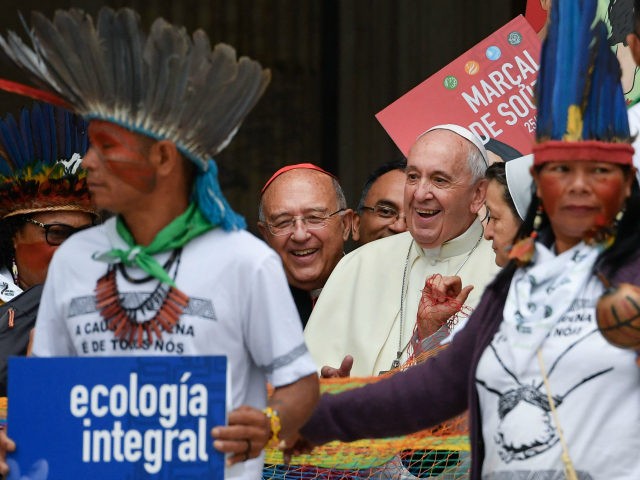ROME — Pope Francis kicked off the long-awaited Vatican synod for the Amazon this weekend, urging in his opening address on Monday greater acceptance of the wisdom and culture of indigenous peoples and cultures.
“We approach the Amazonian peoples on tiptoe, respecting their history, their cultures, their style of good living,” the pope said in his morning speech in the synod hall, “because all peoples have their own identity, all peoples have their own wisdom, self-awareness, peoples have a way of feeling, a way of seeing reality, a history, a hermeneutic and tend to be protagonists of their own history with these things, with these qualities.”
While not condemning the European colonization and evangelization of the New World outright, Francis distanced himself from colonizing “ideologies” as well as “proselytism.”
We approach the Amazonian peoples “far from ideological colonizations that destroy or reduce the idiosyncrasies of peoples,” he said. “Today this ideological colonization is so common.”
“We also approach them without the entrepreneurial desire to impose pre-prepared programs on them, to ‘discipline’ the Amazonian peoples, discipline their history, their culture,” the pope said.
We must reject the “desire to tame the native peoples,” he added.
Historically, Spanish and Portuguese missionaries and colonizers who came to the new world rejected and outlawed many native customs incompatible with Christianity, such as human and child sacrifice, polygamy, idol worship and other rituals practiced by the Aztec, Mayan, Inca, and Moche tribes. The missionaries often saw their work as an effort to “civilize” indigenous peoples.
Some reformer missionaries, such as Fra Bartolomé de las Casas, who became the first bishop of Chiapas, advocated for the rights of the native peoples against abuses by European colonizers, arguing for their equal human dignity.
In his address Monday, Pope Francis said that in the past, the Church sometimes forgot that its role was not to tame native peoples, and because of this, “it was not inculturized,” but even reached “the point of scorning certain peoples.”
“Ideologies are a dangerous weapon,” Francis said. “We always tend to seize an ideology in order to interpret a people. Ideologies are reductive and lead us to exaggerate in our attempt to understand intellectually, but without accepting, understand without admiring, understand without assuming, and then reality is received in categories, the most common of which are the categories of ‘isms.’”
Over the past months, a number of prominent Catholic prelates have criticized the working document of the Amazon synod of bishops, in part because of its emphasis on indigenism.
In mid-July, for instance, Cardinal Gerhard Müller, the former prefect of the Vatican’s Congregation for the Doctrine of the Faith who has extensive personal experience working in South America, issued a lengthy critique of the document, lamenting its “upside-down hermeneutics” and appeals to a “cosmovision with its myths and the ritual magic of Mother ‘Nature.’”
The synod document, in fact, cites the words of the indigenous people in this regard: “We, the indigenous people of Guaviare (Colombia), are part of nature because we are water, air, earth and life of the environment created by God.”
“Therefore, we ask that the mistreatment and extermination of ‘Mother Earth’ cease. The earth has blood and is bleeding, the multinationals have cut the veins of our ‘Mother Earth’. We want our indigenous cry to be heard by the whole world,” it reads.

COMMENTS
Please let us know if you're having issues with commenting.